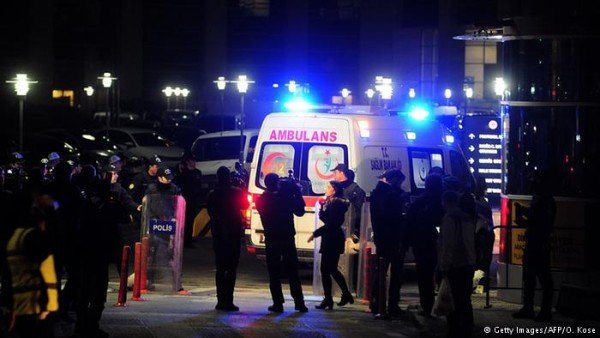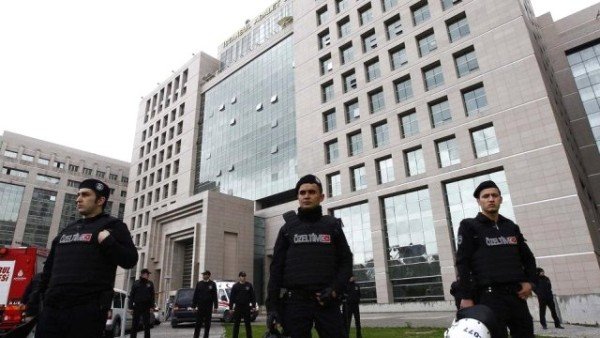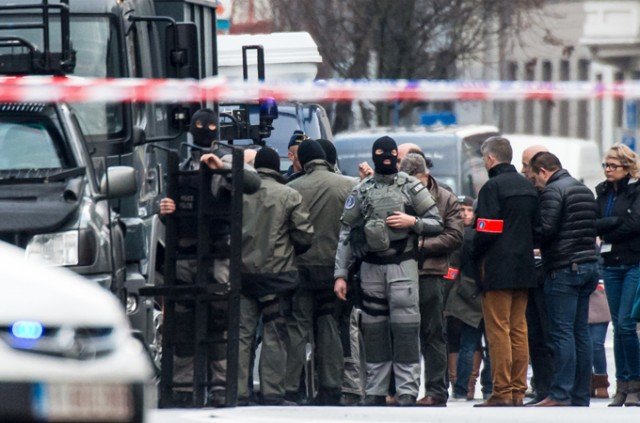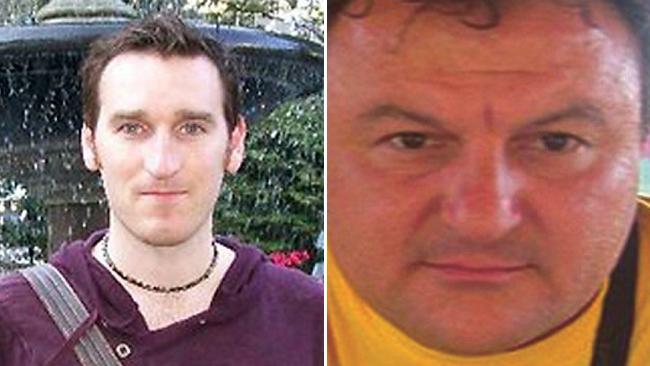Home Tags Posts tagged with "hostage"
hostage
Turkish prosecutor Mehmet Selim Kiraz has been badly wounded and two gunmen who took him hostage killed after a shootout at a courthouse in Istanbul, officials say.
Gunshots were heard and smoke was seen rising from the scene, after special forces reportedly entered the building.
Mehmet Selim Kiraz was apparently taken hostage because he had headed an inquiry into the death of teenager Berkin Elvan during anti-government protests in 2013.
A banned Marxist revolutionary group is said to be behind the incident.
A statement posted online had said Mehmet Selim Kiraz would be killed if the group’s demands were not met.
Istanbul’s police chief Selami Altunok said that police had negotiated with the gunmen for six hours, but eventually stormed the courthouse “because of gunshots heard from inside the prosecutor’s office”.
“Our prosecutor is in hospital and seriously wounded,” he said, adding that he would require an operation.
The gunmen had released dramatic images of a gun being held to the head of Mehmet Selim Kiraz as the hostage crisis unfolded.
The Turkish government banned live TV coverage of the incident, citing security concerns.
Sukriye Erden, a lawyer negotiating with the hostage takers, said they had demanded that the police announce the names of four members of the security services whom they said were connected to the death of Berkin Elvan.
Berkin Elvan, who was then 14, was struck in the head by a police tear gas canister in June 2013 as he went to buy bread during mass demonstrations that began in Istanbul and spread across Turkey.
He died in an Istanbul hospital last year, after spending nine months in a coma.
Recep Tayyip Erdogan, now Turkey’s president, inflamed passions shortly after the teenager’s death when he said the boy had been carrying a slingshot and had been “taken up into terrorist organiations”.
Suspected members of the Revolutionary People’s Liberation Party-Front (DHKP-C) took the prosecutor hostage on the sixth floor of the Caglayan court house, reports said.
The DHKP-C is considered a terrorist group by Turkey, the European Union and US. It said it carried out a suicide bombing in February 2013 at the US embassy in Ankara, where a security guard was killed.
In January, a man linked to the banned Marxist group was arrested near the prime minister’s offices in Istanbul, reportedly after throwing two grenades that failed to explode.
[youtube mpFFThQojkU 650]
Turkish prosecutor Mehmet Selim Kiraz, who is heading the inquiry into the death of teenager Berkin Elvan during anti-government protests in 2013, has been taken hostage by gunmen in Istanbul.
Dramatic images have emerged on social media of a gun being held to the head of Mehmet Selim Kiraz at a court house in Istanbul.
A banned Marxist revolutionary group is said to be behind the incident.
A statement posted online said Mehmet Selim Kiraz would be killed if their demands were not met.
Turkish special forces entered the court house, which was evacuated, and gunshots were heard from inside the building, Turkish news agencies reported.
City police chief Selami Altinok told reporters that negotiations with the hostage takers were under way.
“We are trying to resolve the issue without anyone being hurt,” he said.
The Turkish government has banned live TV coverage of the incident, citing security concerns.
Berkin Elvan, who was then 14, was struck in the head by a police tear gas canister in June 2013 as he went to buy bread during mass demonstrations that began in Istanbul and spread across Turkey.
After nine months in a coma Berkin Elvan eventually died in an Istanbul hospital.
President Recep Tayyip Erdogan inflamed passions shortly after Berkin Elvan’s death when he said the boy had been carrying a slingshot and had been “taken up into terrorist organizations”.
Suspected members of the Revolutionary People’s Liberation Party-Front (DHKP-C) took the prosecutor hostage on the sixth floor of the Caglayan court house, reports said.
A website close to the group has published a series of demands, including calls for an immediate confession from police officers responsible for the boy’s death, and for an end to prosecutions of protesters charged over the clashes.
Berkin Elvan’s father appealed for the prosecutor to be freed: “My son is dead but let no-one else die.”
The DHKP-C is considered a terrorist group by Turkey, the European Union and US. It said it carried out a suicide bombing in February 2013 at the US embassy in Ankara, where a security guard was killed.
[youtube R0w5Q6aJ4dQ 650]
Four gunmen have entered a flat in the Belgian city of Ghent and police have sealed off the surrounding area.
Unconfirmed reports suggested that the four had taken a man hostage and police urged residents to remain indoors for their own safety.
The gunmen burst into the flat in the Dampoort area of the city, in northern Belgium.
“They’re in the building but it’s not clear what’s going on inside,” a police spokesman said.

Photo AP
The head of Ghent police Filip Rasschaert told De Standaard website that they were carrying out the operation carefully because of the potential involvement of a hostage.
Federal authorities were now in control of the siege, he said.
“They have all they need to bring a successful end to a hostage-taking,” he said.
Belgian TV said that another siege had taken place in Ghent in October, involving a man implicated in an earlier hostage-taking. That incident involved an unpaid debt, it reported.
[youtube LpWpR5GNiSE 650]
Judith Tebbutt, the British woman kidnapped in Kenya, has been freed in Somalia six months after she was seized and her husband David killed.
Judith Tebbutt, 56, from Bishop’s Stortford, Hertfordshire, was flown to Nairobi after her family paid the pirates a ransom for her release.
The woman said she was “very relieved” and looking forward to seeing her “fantastic” son Oliver.
Judith Tebbutt’s husband David, 58, was shot by a gang of six men at their remote holiday resort in Kiwayu, north of Lamu island, in Kenya.
Social worker Judith Tebbutt, who is believed to be deaf and was wearing a double hearing aid, said: “I’m very relieved to have been released. Seven months is a long time. Under the circumstances, with my husband passing away, it made it harder.
“I’m just happy to be released and I’m looking forward to seeing my son who successfully secured my release. I don’t know how he did it, but he did, which is great.”
Judith Tebbutt said she was still coming to terms with her husband’s death, which she only found out through contact with her son about two weeks after she was kidnapped.
“I feel extremely sad. Very, very sad indeed. He was a good man. That was very unfortunate. Really horrible. But you’ve just got to pick up the pieces…. and move on,” she said.

Judith Tebbutt, the British woman kidnapped in Kenya, has been freed in Somalia six months after she was seized and her husband David killed
Judith Tebbutt landed in Nairobi on Wednesday where she will be looked after by officials from the British embassy before being flown back to the UK to be reunited with friends and relatives.
Prime Minister David Cameron’s spokesman confirmed the release and said the government would provide consular care in Nairobi.
He said it did not pay ransoms and did not “facilitate concessions to hostage takers”, but had met the family regularly to discuss the case.
It is understood Judith Tebbutt’s son Oliver is in the Kenyan city to greet her.
Judith Tebbutt was seized on 11 September last year from Kiwayu Safari Village, a luxury resort on a deserted stretch of Kenyan coastline, comprised of thatched cottages on the beach.
David and Judith Tebbutt had arrived only the previous day and were the only guests.
Judith Tebbutt was taken away in a speedboat by Somali pirates, after her husband had been killed.
It appears that a private security company had secured her release, not British officials.
It was unclear how much money was involved, and revealing the amount was generally discouraged to avoid copy-cat gangs.
Paying the ransom was not illegal because it was not known to be going to a terrorist organization, he added.
The ransom had been paid in the last three days.
Rick Blears of Save Our Seafarers, the global anti-Somali piracy campaign, said that “any move at government level to ban the payment of ransoms to pirates, as US Secretary of State Hilary Clinton proposes, would have a massively detrimental effect and put the lives of hostages at grave risk”.
Police in Kenya said six gunmen had burst into the Tebbutts’ room last September and officers speculated that David Tebbutt may have tried to resist the gang.
David Tebbutt worked for publisher Faber & Faber and sat on the board of the Book Trade Charity, which supports those in the book trade.

David Tebbutt worked for publisher Faber & Faber and sat on the board of the Book Trade Charity
The Kenyan government said at the time of the kidnap that it believed the al-Shabab Islamist group, which has since merged with al-Qaeda, was behind the murder and kidnap. The group denied the allegation.
In October 2011, Kenya sent troops into its neighbor in pursuit of the militants and in support of the weak interim Somali government, which controls only the capital, Mogadishu, and a few other areas.
Rachel Chandler, who was held with her husband Paul for 13 months by pirates in Somalia, said: “My feeling is one of relief and happiness for Judith Tebbutt and her family, that finally she is free.
“I hope she will have an opportunity to pick up the pieces of her life, and deal with the loss she has had.”
EU foreign policy chief Baroness Ashton said she was delighted Judith Tebbutt was finally free and would work hard to fight the “scourge” of piracy and kidnapping in the horn of Africa.
Last year, two men appeared in court in connection with the attack, with both denying the charges.
One of them, Ali Babitu Kololo, told the court he had been forced at gunpoint to lead a group of men to the hotel and had not been a willing accomplice.
[youtube Hpyz_VDrzyw]
Giulio Terzi, the Italian foreign minister, has asked British government to provide the “utmost clarity” around the failed bid to rescue Chris McManus and Franco Lamolinara, who were kidnapped and killed in Nigeria.
The Italian foreign minister has demanded details “in the next few hours”, an Italian news agency said, after accusations the UK did not inform Italy about the planned mission.
Islamist militants took British Chris McManus, 28, of Oldham, and Italian Franco Lamolinara, 48, hostage in north-west Nigeria last May.
The engineers died as Nigerian and UK forces tried to free them on Thursday.
UK Foreign Secretary William Hague and Giulio Terzi are attending a meeting in Denmark.
William Hague earlier said that the limited time available to make a decision “constrained how much we were able to consult others”.
Italian President Giorgio Napolitano said it was “inexplicable” that the British government had not told Rome about the rescue attempt until it had begun.
Giorgio Napolitano said the UK needed to explain why it did not inform the Italian authorities ahead of the operation.
“The way the British government has behaved is quite inexplicable. To have failed to inform or consult Italy, with regard to a military action which could have such consequences,” the Italian president said.
“A clarification is needed on both the political and diplomatic levels.”
UK Defence Secretary Philip Hammond said Rome had been told of intelligence behind the rescue attempt and informed “as the decision was taken to act”.
Philip Hammond said that the attempted rescue had been launched after information was received that Chris McManus and Franco Lamolinara “were about to be moved – possibly executed”.
He said what had subsequently happened was “very unfortunate but it’s completely explicable”.
“These hostages were taken, they were held at an unknown location for a very long period of time despite extensive efforts to track them down. And when a window of opportunity became available, a well-trained Nigerian force with British support, went in and tried to rescue them,” Philip Hammond said.
“The Italian government was kept informed throughout the operation as the intelligence emerged and then as the decision was taken to act… I don’t think they specifically approved it – they were informed of what was happening.”
Number 10 said earlier that no official complaint had been received from the Italian government, and the UK had not made an apology.
It said the UK and Italy had been in contact ever since the men were kidnapped on 12 May, 2011.
Prime Minister David Cameron’s official spokesman said: “We contacted the Italians yesterday as the operation was getting under way, but this was a very fast-moving situation.
“Our priority was to respond to the situation on the ground and to do everything we could to try and secure the safe release of the hostages.”

Islamist militants took British Chris McManus (left) and Italian Franco Lamolinara (right) hostage in north-west Nigeria last May
In a statement announcing the operation and the deaths of Chris McManus and Franco Lamolinara, PM David Cameron earlier said the decision to act had been taken at very short notice.
“A window of opportunity arose to try and secure their release. We also had reason to believe that their lives were under imminent and growing danger.”
It appeared that the Italian government tended to be in favor of negotiating in hostage situations, while Britain was absolutely against formal government negotiations.
News of the operation broke in a statement from the office of Italian Prime Minister Mario Monti.
It used very similar language to that used by the British side but made it clear the Italians were told the military was being used only after the operation had started.
Mario Monti chaired a meeting of a government security committee to discuss the failure of the attempt to rescue the hostages. The meeting ended after two hours without any comment being issued.
Commons Foreign Affairs Select Committee chairman Richard Ottaway said the UK was not duty-bound to tell Italy about the operation in the circumstances.
Richard Ottaway said: “I can understand the concerns and frustrations of Italian politicians but I think they’ve got to accept and recognize that these are very fast-moving, delicate operations and it’s not always possible to keep politicians briefed in advance of what goes on.”
Mario Monti’s office said he had asked Nigerian President Goodluck Jonathan to provide a “detailed reconstruction” of events as soon as possible.
David Cameron’s spokesman said it was a Nigerian-led operation, with UK support involving the UK’s elite Special Boat Service (SBS).
The house where the kidnapped men were being held had been under surveillance for some time.
David Cameron and Goodluck Jonathan said they believed the kidnappers had killed Chris McManus and Franco Lamolinara.
But an unnamed official from the Nigerian state security service quoted in local reports said the hostages died in the crossfire.
The Nigerian president described it as a “deeply sad and regrettable incident”.
Goodluck Jonathan said that the men’s captors had been seized and “would be made to face the full wrath of the law”.
The Nigerian president said they were from militant Islamist group Boko Haram, which has carried out a number of attacks on police, politicians and clerics who oppose it.
Reports have emerged that a senior member of Boko Haram was captured on Tuesday, and he gave information which led forces to the house where the two construction engineers were being held.
However, on Friday, a spokesman for the group told reporters Boko Haram was not responsible for the deaths.
“We have never taken anyone hostage. We always claim responsibility for our acts,” he said.
Boko Haram has become more violent and capable in recent years and there is a suspicion this may be a sign of the growing influence of the group al-Qaeda in the Islamic Maghreb.
Al-Qaeda in the Islamic Maghreb has a track record of kidnapping Westerners in North Africa and trying to extract ransom payments to fund its violence.
British Chief of Defence Staff General Sir David Richards said that the rescue attempt had sent “a shockwave” through al-Qaeda in the Islamic Maghreb.
“We know that all their leaders are now and disarray and we’re now obviously trying to track them down with our Nigerian allies,” David Richards said.
Gunmen seized Chris McManus and Franco Lamolinara in the town of Birnin Kebbi in the north of Nigeria on 12 May 2011.
Both men worked for Italian firm B Stabilini in the construction of a local headquarters for the Central Bank of Nigeria.
Relatives of Chris McManus released a statement saying they were “devastated” by his death but thanked those who had worked to try to free him.
“During this ordeal we have relied heavily on the support of our family and friends which has never waned and has enabled us to get through the most difficult of times,” the family statement said.
The UK Foreign Office advises against all travel to some areas of Nigeria and against all but essential travel to other areas, but these do not include the area where the men were kidnapped.
It says there is the threat of kidnap and terrorism across the West African country.
[youtube xqe2cfpH8kw]






